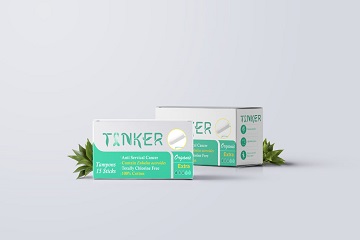TANKER, Innovation of Anti-Cervical Cancer Drugs by IPB Students

Cancer is one of the major health problems in Indonesia. Cervical cancer is a frightening specter that tops the list as the trigger of death in women. Cervical cancer occurs because there are cells around the cervix grow abnormally and breed uncontrollably. Abnormal cells develop rapidly into tumors and malignant tumors will develop into cervical cancer.
Cervical cancer is a type of cancer that most often affects women. According to the World Health Organization (WHO) records, cervical cancer ranks fourth most often suffered by women in the world. Based on data from the Ministry of Health, cervical cancer ranks second most cancer after breast cancer.
The treatment which still causes a lot of risks and the number of cervical cancer patients make three students Bogor Agricultural University (IPB) innovate research entitled Tanker (Tampon Seagrass Anti Cancer) Seagrass Extract Potential (Enhalus acoroides) as a cervical anticancer tampon. This innovation is a treatment of cervical cancer using tampons and seagrass plants extract as a tool for the treatment of cervical cancer patients in Indonesia.
The tanker is the work of three students of IPB, namely Hellen Merlisa Paula, Yoan Andriyansyah, and Rizka Safriliani who is supervised by IPB Biochemistry lecturer Dr. Laksmi Ambarsari. This research has successfully obtained funding from the Ministry of Research, Technology and Higher Education (Kemenristekdikti RI) in the Student Creativity Program (PKM) in the Field of Research.
The function and material of tampon making are the same as the dressing but is compressed into a small tube shape, used by inserting it into the vagina to absorb the menstrual blood. Tampon commonly used for women who are menstruating but want to keep moving freely and actively.
Seagrass is a high-level plant that lives submerged beneath the sea surface. Seagrasses as marine biota can grow in waters that have a high salinity level, so the secondary metabolite is quite superior.
Tanker by IPB students is a tampon covered with herbal capsules from the extract of seagrass plants which based on the results of research is able to inhibit cervical cancer cells. Tankers can be used for patients with cervical cancer as a substitute for sanitary napkins when menstruation or can be used routinely for the treatment of cervical cancer.
After going through various research and research, cytotoxic substances contained in the seagrass plants can work and suppress the intensity of cervical cancer cells. The resistance of seagrass plants to cervical cancer is quite large that is up to 94-95%.
"The use of tampons is still rarely used in Indonesia, this is because tampons are not so well known to the public. Though the tampon is quite comfortable and safe and commonly used by women in various countries. So the innovation of special tampon cancer cervix (Tanker) is very prospective as an option for treatment for cervical cancer patients in Indonesia, "said Hellen when explaining her research innovation.
During this treatment of cervical cancer in the community is by surgery, radiotherapy, and chemotherapy. This treatment poses several risks and impacts for the patient such as tissue damage, intestinal injury, and infection, and immunity to certain drugs. Tanker innovation is able to facilitate the patient to use it without worrying about the side effects caused.
According to Hellen, this study has the advantage of using a sample of seagrass plants from the sea of Bintan Island, which is the conservation of seagrass in Indonesia. Bintan Island region including Indonesia with the high number of patients with cervical cancer. In addition, the utilization of seagrass as an anti-cancer drug is also useful to explore marine biota that has been still not utilized to the fullest. Currently, Tanker has been available in packaging. Each package contains 15 Tampon sticks equipped with tampon mount applicator. Hellen and Tim hope that this product can be tested in vivo and clinical trials to be mass-produced. (flw)



